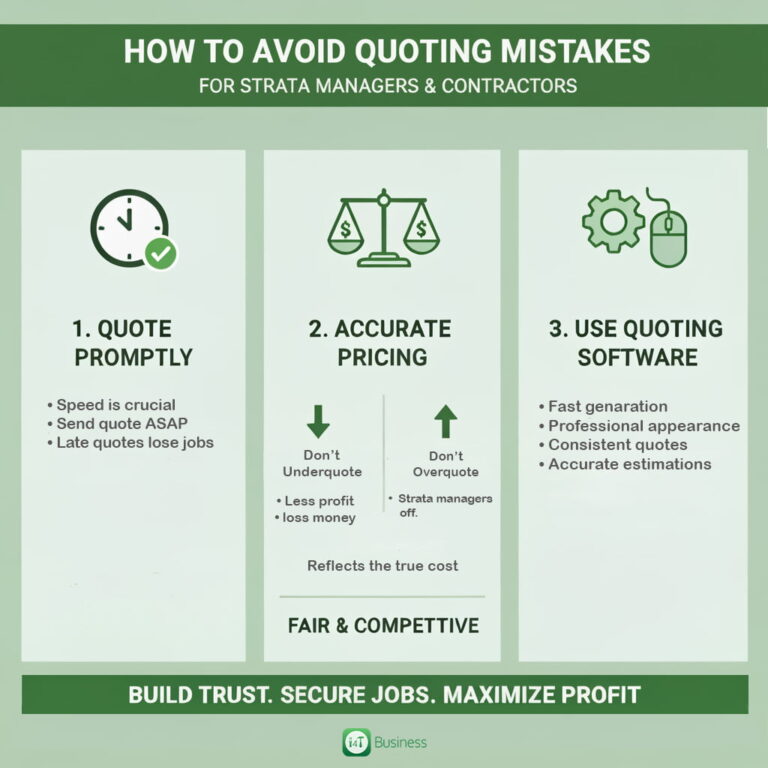As a tradie, working with strata managers can be a fantastic way to secure consistent, well-paying jobs. Strata managers are responsible for overseeing property maintenance and management of common areas, such as apartment complexes and commercial buildings. But, just like any professional relationship, it’s important to get things right from the start.
Unfortunately, many tradies make simple but costly mistakes when working with strata managers. These missteps can lead to lost opportunities, delayed payments, or even damaged reputations. The good news? By understanding and avoiding the most common mistakes, you can strengthen your relationship with strata managers and make your work life a lot easier.
In this article, we’ll walk you through the top 5 mistakes tradies make when working with strata managers, and offer practical tips on how to avoid them. Let’s get started!
1. Failing to Understand the Scope of Work
One of the biggest mistakes tradies make when working with strata managers is failing to fully understand the scope of the job before getting started. Strata managers often have a clear idea of what needs to be done, but if you don’t take the time to clarify the specifics, it can lead to confusion, delays, and unexpected costs down the line.
For example, you might assume the job is a simple repair, only to find out later that it involves additional work, like cleaning or safety checks, which you hadn’t accounted for. This can leave you scrambling to fix things on the fly, or worse, result in a dissatisfied customer.
How to Avoid This Mistake:
- Ask Questions: If anything is unclear about the project, don’t hesitate to ask the strata manager for more details. What exactly needs to be done? Are there any special requirements or deadlines? This will ensure you’re on the same page from the get-go.
- Get It in Writing: Always request a clear, written description of the scope of work, including any specific tasks or expectations. This helps prevent any misunderstandings later on.
- Use a Project Management Software: With the right tools, like work order or job management software, you can keep track of project details and updates in real-time, ensuring everything is recorded and nothing gets overlooked.
By taking these simple steps, you’ll have a much clearer idea of what’s required, which leads to smoother, more efficient work with fewer surprises.
2. Not Communicating Regularly and Transparently
Communication is key in any working relationship, and it’s no different when working with strata managers. One of the most common mistakes tradies make is not keeping strata managers informed about the progress of a job, delays, or issues that arise.
When communication breaks down, it can lead to frustration, confusion, and even damage to your reputation. Strata managers rely on timely updates to ensure everything runs smoothly and that issues are addressed quickly. Failing to keep them in the loop can leave them feeling out of control and can harm your chances of getting future work.
How to Avoid This Mistake:
- Provide Regular Updates: Keep the strata manager informed at every stage of the project, whether it’s to report progress, highlight any challenges, or confirm when work is completed. Simple updates can make a big difference.
- Be Transparent: If there’s a delay or unexpected issue, be upfront about it. Strata managers appreciate honesty and will be more understanding if you keep them in the loop rather than letting things drag on without communication
- Leverage a Communication Tool: Using a digital platform that tracks the progress of your jobs can make communication much easier. You can share updates, mark tasks as complete, and even send invoices or quotes, all in one place. This keeps everything transparent and helps build trust.
By ensuring regular and transparent communication, tradies not only avoid misunderstandings but also show the strata manager that you’re reliable and professional.
These qualities lead to more work in the future
3. Underquoting or Overquoting Jobs
When it comes to quoting, timing, and accuracy are key. Strata managers, by law, are required to get at least three quotes for any maintenance work in order to secure the best value for property owners. This means if you don’t provide your quote on time, they could very well go elsewhere, even if your price is reasonable.
Being late with your quote can lead to missed opportunities. Strata managers need to ensure they’re getting competitive quotes, and if you’re too slow to respond, they may opt for someone else. On the flip side, if your quote isn’t accurate, whether that’s underquoting to win the job or overquoting to cover yourself, you risk damaging your reputation or losing the job altogether.

How to Avoid This Mistake:
- Quote Promptly: Make sure to send your quote as quickly as possible once you have all the information you need. If you’re late, you may miss out on the job. Using job management software can help you generate quotes on the spot, making it easier to respond quickly.
- Don’t Underquote or Overquote: While being quick is vital, it should not come at the expense of an inaccurate quote. Underquoting might seem like a way to secure the job, but it’s a risky move. If the job turns out to be more complex or time-consuming than anticipated, you’ll end up with a smaller profit or even lose money. Make sure your quote reflects the true cost of the job, including materials, labour, and any other associated costs.While you want to ensure you’re covering costs, overquoting can turn strata managers off. A fair and competitive price, based on accurate estimations, will help build trust and keep you in the running for future work.
- Use a Job Quoting Software: By using software, you can quickly generate professional and accurate quotes based on the specifics of the job. This not only saves you time but also ensures your quotes are consistent and precise.
Timely and accurate quoting helps tradies stay competitive while ensuring they're compensated fairly for your work.
In the long run, this builds trust with strata managers and opens up more opportunities for you to win jobs.
4. Ignoring Compliance and Regulations
When working on strata properties, it’s crucial to follow all local regulations and building codes. This is not just about doing things the right way; it’s about protecting both yourself and the strata manager from potential legal issues. Many tradies make the mistake of overlooking important compliance requirements, thinking that their work won’t be scrutinised. However, strata managers have a responsibility to ensure that all maintenance work meets the necessary standards, and failing to comply with regulations can lead to delays, fines, or even job cancellations.
In the worst-case scenario, neglecting compliance could cause damage to the property or create unsafe conditions, which could result in costly repairs or insurance claims. This is something no one wants, and it’s completely avoidable with the right approach.
How to Avoid This Mistake:
- Stay Up-to-Date on Local Regulations: Make sure you’re familiar with the latest regulations regarding safety, building codes, and any specific requirements for strata properties. This could include things like asbestos handling, electrical safety standards, or waste disposal rules. Regularly check for updates to ensure you’re always in the know.
- Communicate with the Strata Manager: If you’re unsure about any compliance requirements, don’t hesitate to ask the strata manager for clarification. They can often provide specific guidelines or requirements for the property that you’ll need to follow.
- Document Everything: Keep detailed records of all inspections, permits, and compliance checks. These documents can be valuable if any issues arise down the track or if the strata manager needs proof that the job was completed according to regulations.
- Use Job Management Software: Job management software to upload all your compliance documents for easy tracking and get notified when they are about to expire.
By prioritising compliance and keeping up with regulations, tradies not only avoid legal trouble but also demonstrate professionalism to the strata manager.
This builds trust and positions you as a reliable tradie who can handle the complexities of strata work.
5. Inadequate Record-Keeping and Documentation
One of the most important aspects of working with strata managers is maintaining clear and accurate records. Inadequate documentation can lead to confusion, missed payments, or even disputes over the work that was done. Strata managers need to have a detailed record of the work completed, materials used, and time spent in order to ensure everything aligns with the original agreement and budget.
Without proper records, there’s a risk that work may not be recognised or paid for, or that misunderstandings will arise about what was agreed upon. In worst-case scenarios, this could even harm your reputation with the strata manager, making it harder to secure future work.
How to Avoid This Mistake:
- Keep Detailed Records: From the moment you start a job, keep track of everything. This includes quotes, contracts, materials used, labour hours, and any correspondence with the strata manager. It’s always better to have too much documentation than not enough.
- Document Work Progress: Take notes on any changes to the job scope, unexpected issues, or delays. This will help ensure that everyone is on the same page, and you’ll have a record to refer to if there are questions later on.
- Use Job Management Software: A good job management system can help you keep all of your records organised in one place. You can log tasks, upload invoices, track time, and even attach photos or reports. This makes it easy to keep both you and the strata manager updated on the job’s progress, and it also ensures all details are securely stored.
Invoice Promptly: Once the job is completed, make sure to send an accurate invoice as soon as possible. Prompt invoicing ensures you get paid on time and shows professionalism.
Proper record-keeping is not just about staying organised; it’s about protecting yourself and your trades business.
It builds trust with strata managers and ensures smooth communication, which is key to maintaining a strong, long-term working relationship. With the right tools, like job management software, keeping track of everything becomes effortless and ensures you’re always covered.
Conclusion
Building a strong working relationship with strata managers is essential for tradies looking to secure more consistent and profitable jobs. By avoiding these common mistakes, whether it’s underquoting, failing to communicate, or not keeping track of compliance, you’ll set yourself up for success.
Clear communication, accurate quoting, understanding the scope of work, staying on top of regulations, and maintaining proper records are all critical to ensuring smooth, stress-free projects. When you focus on these areas, not only will you build trust with strata managers, but you’ll also position yourself as a reliable and professional tradie who gets the job done right.
By improving your processes and staying organised, you’ll increase your chances of securing future work and cultivating long-term, positive relationships with strata managers. So, take the time to assess your current approach, make adjustments where necessary, and you’ll be well on your way to building a reputation that stands out in the industry.
If you’re looking to simplify your workflow and stay on top of all your jobs, consider trying i4T Business Job Management Software. It’s designed to help tradies like you manage quotes, jobs, compliance, and communications with ease, giving you more time to focus on what you do best.
Start free trial today and see how it can streamline your work and help you win more projects!
FAQs
The top mistakes include failing to understand the scope of work, poor communication, inaccurate quoting, ignoring compliance and regulations, and inadequate record-keeping.
Clear and regular communication ensures that both parties are on the same page, helps manage expectations, and prevents misunderstandings, leading to smoother project completion and future opportunities.
Tradies should quote promptly and accurately, taking into account all costs such as materials, labour, and potential complications. A fair and competitive price helps build trust with strata managers.
Tradies should stay updated on local regulations and building codes, ensure they have the necessary permits, and document all compliance-related tasks to avoid legal issues and maintain professionalism.
Tradies should keep detailed records of quotes, contracts, job progress, materials used, and communications. Using a system to store this information ensures accurate invoicing and smooth future interactions with strata managers.
Hot off the press!

With our cutting-edge technology and in-depth knowledge of how the
Field Service Management sector operates, the i4TGlobal Team loves to share industry insights to help streamline your business processes and generate new leads. We are driven by innovation and are passionate about delivering solutions that are transparent, compliant, efficient and safe for all stakeholders and across all touch points.




